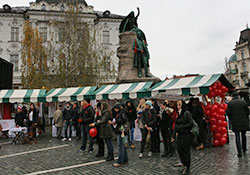World Aids Day events in Slovenia focus on prevention and early testing

WHO
World AIDS Day and the European HIV Testing Week were marked in Slovenia with a national conference on 27 November 2014 organized by the National Institute of Public Health in cooperation with the WHO Country Office in Slovenia and the Ministry of Health. In addition, through a Project Virus run by medical students, passersby were invited to chat about safe sex at the popular Prešeren Square in Ljubljana on 1 December, and free testing for HIV infection was provided by the nearby National Institute of Public Health and Clinic of Infectious Diseases.
The national conference focused on two themes: how to improve the accessibility and availability of testing and how to reduce stigma and discrimination among HIV-infected persons. Nongovernmental organizations played a visible role at the meeting and contribute significantly to HIV prevention and control in Slovenia.
HIV in Slovenia
In light of the continuing spread of HIV, the goal of the global World AIDS Day campaign is to realize “zero new HIV infections, zero discrimination and zero AIDS-related deaths”. In Slovenia, the most pressing problem is growth in the number of infected men who have sex with men.
Between 2004 and 18 November 2014, Slovenia indentified 450 HIV infections and 23 patients with AIDS died. It is estimated that an additional 150 to 200 people in Slovenia are unaware of their infection and are spreading HIV.
More than half of infections in Slovenia are detected too late – when the infected person should already be receiving treatment. The opportunity for early and more effective treatment and to limit transmission has therefore been missed. Despite considerable efforts to improve the accessibility of testing among members of this group, there is as yet no indication that the proportion of recently tested men who have sex with men has risen significantly or that the proportion of late diagnoses has declined.



